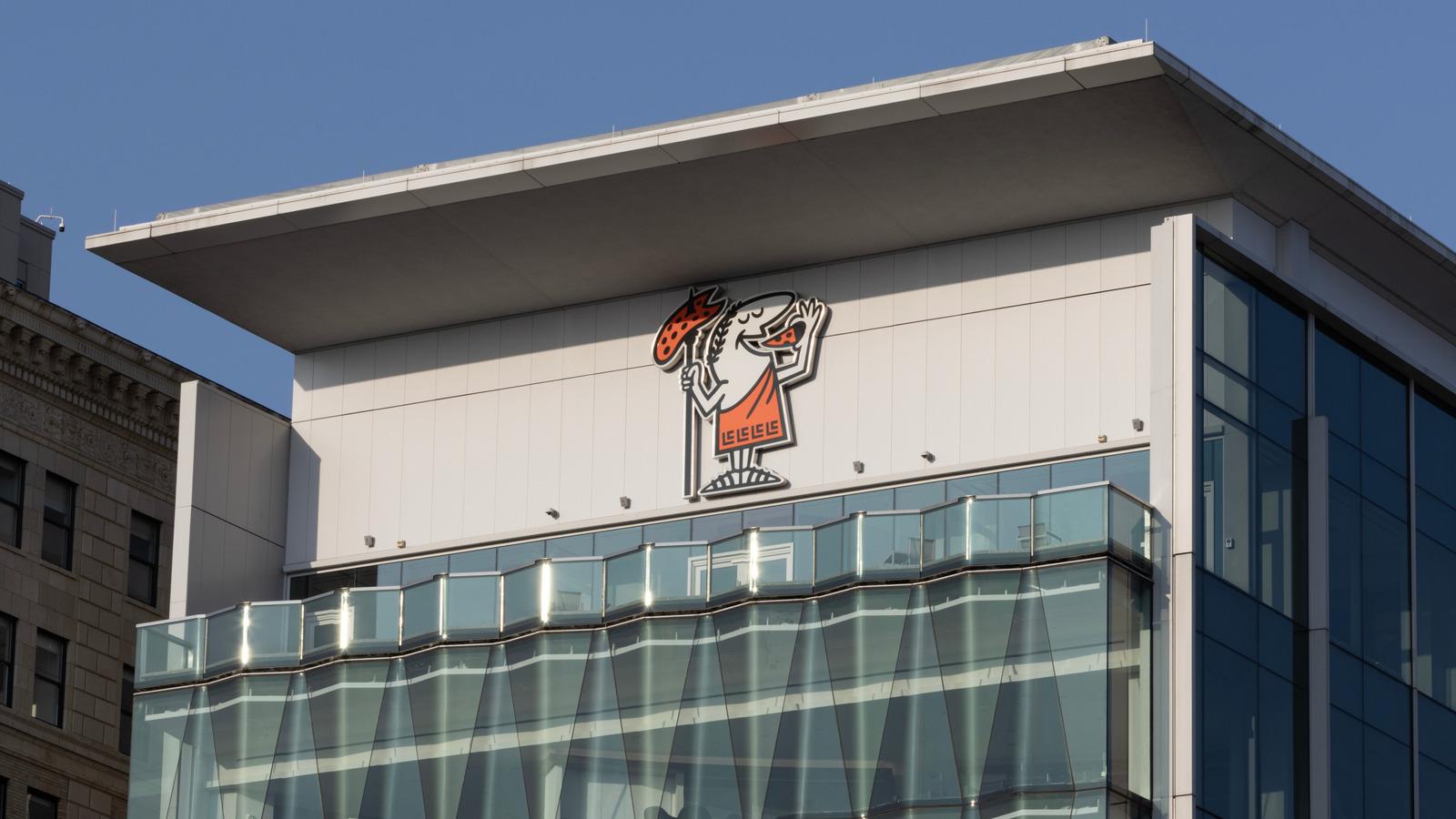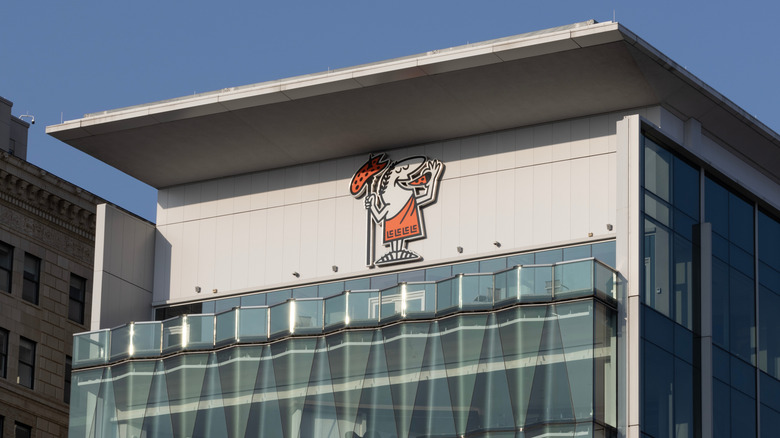
Jonathan Weiss/Shutterstock
Detroit is perhaps best known for cars and music, but let's not forget about its food scene. You might have already checked out some of the classic Detroit foods you need to try before you die, but did you know about all the popular restaurant chains that started in Detroit? Motor City's thriving food culture might play a part in why it's had so many restaurants turn into much-loved chains, even though it's only one of many cities across the nation.
Given that Detroit has its own classic pizza style inspired by car factory parts, it's no surprise that several pie shops have gone national. But that's not all the city has to offer. Its Coney dogs and Coney Island restaurants are perhaps equally iconic to those in the know, and have expanded to other parts of the country. And there are also sub shops, cheesesteak joints, and more that have broken out to form larger chains. Sure, it might be disappointing for original customers who wanted to keep their fave spot a secret, but it's great news for the rest of us.
Here are nine popular restaurant chains that started in Detroit. Each has a story of hustle, neighborhood loyalty, and that particular Detroit spirit of feeding people well without breaking the bank. Now you might be able to get their food elsewhere, but it all started in Motor City. You might even be lucky enough to have one in your neighborhood to try out.
Little Caesars
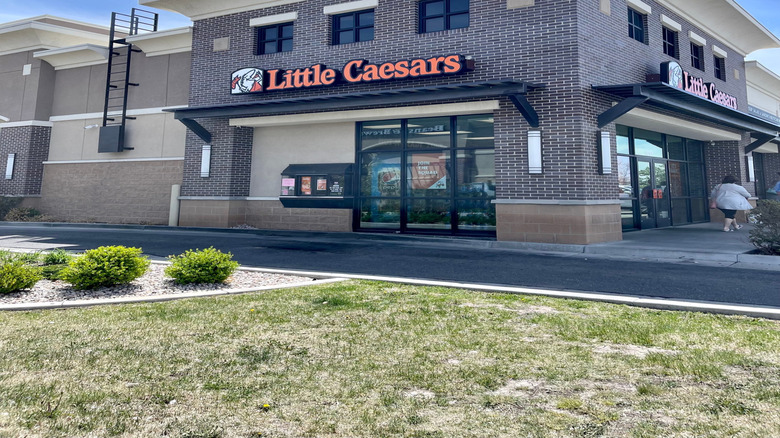
Lori Butcher/Shutterstock
You can't talk about Detroit-born chains without starting with Little Caesars. It began in 1959 when Mike and Marian Ilitch opened a single pizza store in Garden City, a Detroit suburb, using a $10,000 investment scraped together from Marian's savings and Mike's minor league baseball earnings. The $10,000 dollars ultimately turned into billions — Little Caesars is the third most popular U.S. pizza chain behind Dominos and Pizza Hut.
By the 1970s, Little Caesars had launched its "Pizza! Pizza!" slogan, offering two pizzas for the price of one, a marketing move that helped the brand grow rapidly. In 1985, the chain introduced the conveyor oven system, which made its hallmark Hot-N-Ready model possible: large pepperoni or cheese pizzas available on demand without calling ahead. And, a more little-known Little Caesars fact, founder Mike Ilitch was a benefactor of civil rights activist Rosa Parks.
Little Caesars also has deep Detroit roots beyond its food. The Ilitch family eventually purchased the Detroit Red Wings and the Detroit Tigers, investing heavily in downtown's revival. Meanwhile, Little Caesars became a household name, known for its bright orange branding, no-frills service, and reliably inexpensive pizzas. It's probably the most iconic fast food chain ever to come out of the city. What's more, it's proud of its Motor City heritage. This is a success story that spanned generations and funded ailing sports teams. So, Little Caesars will always be part of the history of Detroit.
Tubby's Sub Shop
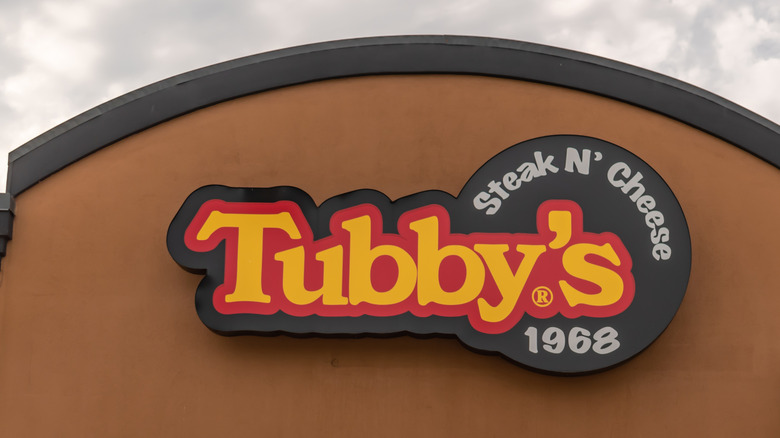
Bruce VanLoon/Shutterstock
Tubby's Sub Shop got its start in 1968 on 13 Mile and Harper in St. Clair Shores, part of the Detroit metro area, when founder Richard Paganes opened his first location. He was just 21 when he opened this branch, but it soon became a hit. Today, Tubby's might not make it high on our list of the best sandwich chain Italian subs, but at the time the shop was a big deal. It was one of the first in the area to grill subs to order, setting it apart from other, similar options.
Word spread quickly, and Tubby's expanded across the Detroit area, bringing its warm, customizable subs to more neighborhoods. By 1977, less than 10 years after opening, Paganes owned 12 Tubby's locations. Not bad for a 30-year-old who started out with one small sandwich shop. But things didn't end there.
Tubby's also capitalized on the franchising boom of the 1970s and 1980s, letting local entrepreneurs in other areas open their own shops under the brand name. This helped with expansion, and may be part of the reason why it's still around. Today, Tubby's remains a familiar name for Detroiters and folks all over Michigan. It may not be a nationwide chain in the same way that another sub shop that shall not be named is, but it has a cult following. It still offers grilled subs — such as cheesesteak and pizza burger options — plus cold subs, sides, and desserts. There's lots to offer, and we're glad it has lasted all these years.
Jet's Pizza
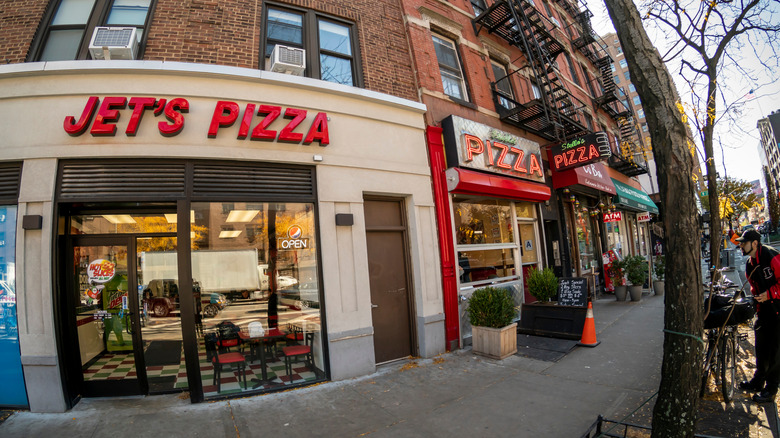
rblfmr/Shutterstock
Jet's Pizza may have gone national, but it's still one of Detroit's favorite exports. It puts thick, square-cut Detroit-style pizza at the forefront, something the city is proud of. Brothers Eugene and John Jetts opened the first Jet's Pizza in 1978 in Sterling Heights. A spontaneous decision led to the opening of this pizza chain. It all started when Eugene was on his way to buy a house — but instead he ended up taking out a lease on a retail unit. A bit of a rash decision, perhaps, but it seems it paid off.
The first location was known as Jetts Party Shoppe & Pizzeria, selling wine and beer as well as pizza, chicken, and seafood. But the name and offerings changed over the years. If you're not familiar with Detroit-style pizza, it has an airy yet crispy crust, sauce layered on top, and edges lined with browned, crunchy bits of cheese that form where it meets the pan. Jet's didn't invent this style, but the chain did help make it known beyond Detroit. The company now has chains in 22 states, so you can now easily get this style of pie in most parts of the country.
However, it's not the only thing you can get at Jet's. It also sells other varieties of pizza, such as thin crust and NY-style. Still, the brand's Detroit-style pepperoni is still the best fast food pepperoni pizza you can buy, so the original offerings are still arguably the best. The brand's history is a story of how a hyper-local style of pizza became a national hit, thanks to the Jetts' commitment to staying true to the flavors of Detroit.
Olga's Kitchen
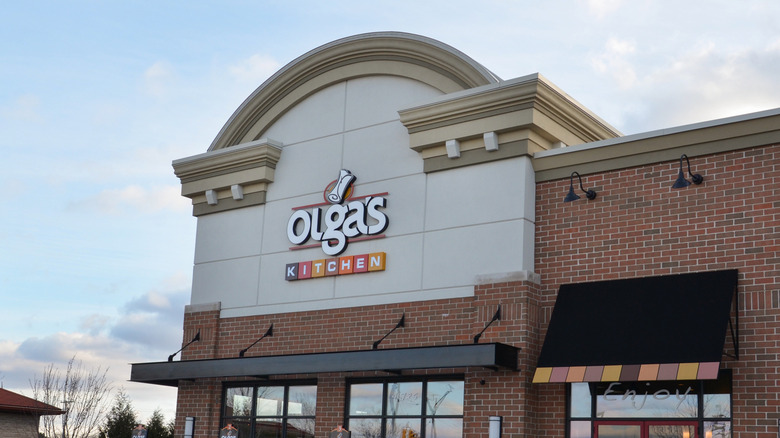
Susan Montgomery/Shutterstock
Olga's Kitchen was founded by Detroit-resident Olga Loizon. She went on a trip to Greece in the mid-1960s to visit family. There she tried souvlaki, a traditional Greek flatbread sandwich filled with meat grilled on a skewer, and fell in love with it. On her return, inspired by the flavors of her heritage, Loizon created a recipe for a soft, slightly chewy flatbread that would become the foundation of her restaurant. She was also loaned money by her uncle to buy a vertical rotisserie machine. The rest is history.
The first location was in an international market hall, but Olga's soon expanded throughout Michigan and the Midwest. Today, Olga's Kitchen has locations in Michigan, Illinois, Ohio, and Wisconsin. Souvlaki-style wraps are still at the heart of the menu, but there's so much more — bowls, salads, soups, zucchini fries, and Mediterranean-style snacks. It might be a staple in mall food courts and shopping centers, but it's stuck around for a reason, introducing diners to new Mediterranean flavors.
The food has always spoken for itself, focusing on fresh preparation and great flavors that set it apart from other quick-service chains. Olga Loizon's commitment to quality and her fearless approach to introducing Detroit to a new type of comfort food continues to pay dividends.
Buddy's Pizza
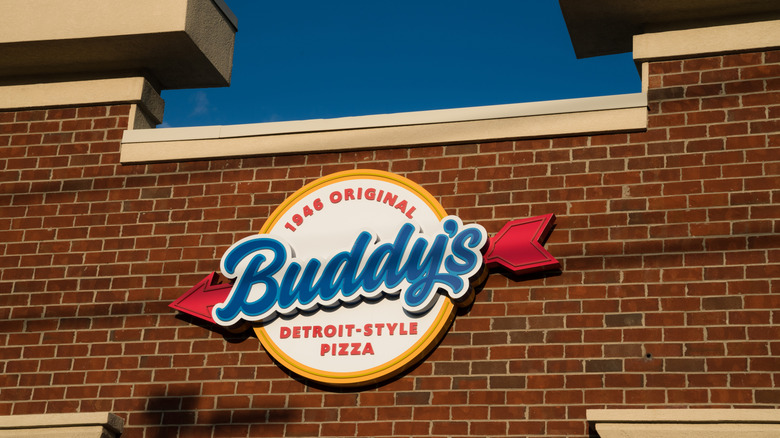
Ilze_Lucero/Shutterstock
Ask Detroiters where to get the best pizza, and Buddy's will inevitably come up. It's the birthplace of Detroit-style pizza, after all. Founded in 1946 on the corner of Six Mile and Conant Street, Buddy's transformed what was once a neighborhood bar into the epicenter of a pizza revolution. If you can imagine it, this was a world without the deliciousness that is a Detroit pie. People all over the U.S. were eating round pizzas, but all that was about to change, thanks to the founder of Buddy's.
Detroit-style pizza is defined by its square shape, thick and airy crust, caramelized cheese edges, and sauce ladled on top rather than underneath the cheese. It's said that Buddy's original owner, Gus Guerra, started baking pizzas in forged steel pans intended for auto parts, which helped create those signature crispy edges and corners. Nobody could have guessed, but the first Detroit-style pizza was enough to spark a phenomenon.
Buddy's has expanded across Michigan, though most of its branches are still within the Detroit metro area. However, its focus is still on quality ingredients and preparation, double-proofing its dough, using Wisconsin brick cheese, and staying true to the baking method that made its pies famous. Beyond pizza, Buddy's offers a range of salads, pastas, and sandwiches, but it's the square pies that keep people coming back. This small chain truly deserves its spot in the rich history of pizza.
Lefty's Cheesesteaks
Lefty's Cheesesteaks may have started in Detroit only in 2012, but it quickly became a fast-growing name in the sandwich department, expanding across Michigan and into Ohio. Founder Sam Berry opened the first Lefty's with the goal of bringing a Philly classic to Detroit but with a twist, adding flavors and combinations that reflect the contemporary tastes.
The menu features the classic cheesesteak — steak, grilled onions, melted cheese on a soft hoagie roll — but also other options. You can get the Southpaw, which features crushed Flamin' Hot Cheetos, and the Big Poppa, with pickles and Thousand Island dressing, among others. The brand leans into lesser-visited ingredient combos while maintaining the essence of a proper cheesesteak.
Lefty's also offers loaded fries, burgers, hoagies, and sandwiches, so there's something for everyone. Despite its rapid expansion, Lefty's keeps the focus on freshness and generous portions, which might be part of its appeal. It's a modern Detroit success story, showing that there's room for new ideas, even in a crowded food scene. Time will tell if it will become a national success, like Little Caesars, or if it will remain a regional chain, but it's doing well so far. We'll be following its next moves and, you never know, it could show up in a town near you soon.
National Coney Island
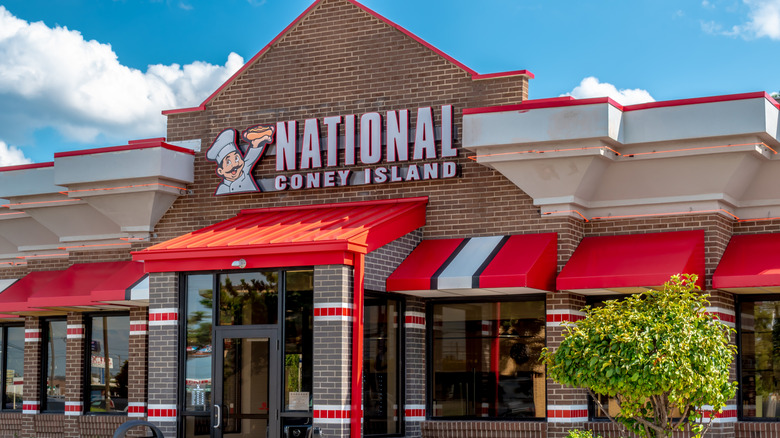
Bruce VanLoon/Shutterstock
The classic Coney dog is a Detroit institution, and National Coney Island has played a big part in keeping that tradition alive since it was founded in 1965. Starting with a single location in Macomb Mall, Roseville (a Detroit suburb), the brand was launched by James Giftos, who saw the enduring appeal of a chili-smothered hot dog topped with mustard and onions.
If you're not from Detroit, it's easy to assume a Coney Island restaurant is an eatery found on Coney Island. But in Motor City, a Coney Island restaurant is its own thing. It's part diner, part Greek-American restaurant, and part 24-hour neighborhood hub where you can grab a chili dog at midnight or an omelet at 7 a.m. But yes, you can expect each one to serve Coney dogs — hot dogs nestled in steamed buns, topped with a beef chili, yellow mustard, and raw diced onions. It's all tied to the city's Greek immigrant history, with many Coney Island restaurants originally opened by Greek families in the early 20th century.
But we're here to talk about National Coney Island — a chain that might not exactly be national but can be found in various parts of Michigan. It has a menu that extends beyond Coney dogs to include burgers, Greek salads, gyros, and hearty breakfasts served all day. The casual, diner-like atmosphere makes National Coney Island a go-to spot for many. It's not fancy, but it says a lot about the city's food history.
Ram's Horn
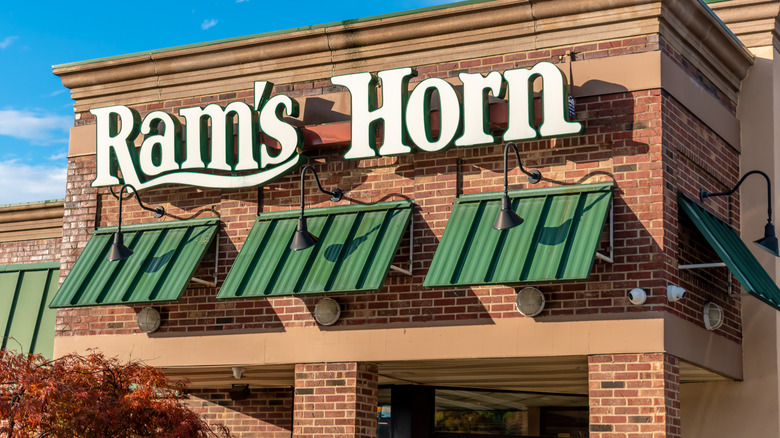
Bruce VanLoon/Shutterstock
Ram's Horn is the kind of classic diner chain that feels like it's always been there. It's a reliable place for pancakes on a Sunday morning, a late-night slice of pie, or a bottomless cup of coffee during a long chat with a friend. But it's more than that, too. Founded in 1967 by brothers Eugene, Steve, and Constantinos (aka Gus) Kasapis, Ram's Horn quickly became a Detroit-area staple, offering homestyle meals in a welcoming, unpretentious environment.
The brothers' first restaurant was in Detroit's Cadillac Square. A second location opened in 1968 in Livonia, and a third in 1970 on Dequindre and 13 Mile. But, before they even started, they had years of restaurant experience working with their father at his restaurant Receiving Lunch in the Greektown district of Detroit. All this experience paid off: In 1974, they franchised and even more Ram's Horns were born. Today, it has 12 locations across metro Detroit. The Kasapis family has kept the business locally focused, prioritizing consistency and hospitality over flashy reinventions.
You can expect a huge menu, with all-day breakfast as well as other diner classics like burgers and pie. But it also goes beyond this into Italian food, Tex-Mex, and more. Does it do everything brilliantly? Probably not. You can't expect the kind of high-end pasta dishes you'd get at a good Italian restaurant, for instance, but the quality is reliable and you know what you're getting. There's a reason it's been around over 50 years.
Happy's Pizza
Given Detroit's passion for quality pies, it's no surprise this is the fourth pizza joint on this nine-item list. But this one has pulled itself up by its bootstraps to be where it is today. Founded in 1994 by Happy Asker on Detroit's east side, Happy's Pizza wasn't in a great neighborhood, but it brought good food to a historically under-served area. What began as a single neighborhood pizza shop quickly expanded into a regional chain across Michigan, Ohio, and other states, driven by a commitment to serving communities often overlooked by larger pizza chains.
While pizza is in the name, Happy's sets itself apart by offering much more than pies. Barbecue ribs, fried chicken, seafood dinners, sandwiches, salads, and a wide range of sides are all part of the lineup. It's the kind of place where you can feed a large family or group with varying tastes. Its pizza isn't Detroit-style, but the pies feature fresh dough made daily. Happy's locations maintain a no-frills, neighborhood-friendly vibe, with a focus on service and portions that rarely leave diners hungry. The chain's flexibility in offerings is something many customers love, although overall reviews are mixed.
Despite expanding its footprint, Happy's Pizza brings a sense of local pride to each location it opens. The chain is serious about community outreach, feeding unhoused people, supporting education, and clothing kids who would otherwise go without. It's a reminder that a pizza chain can be more than just a place to grab a slice.



